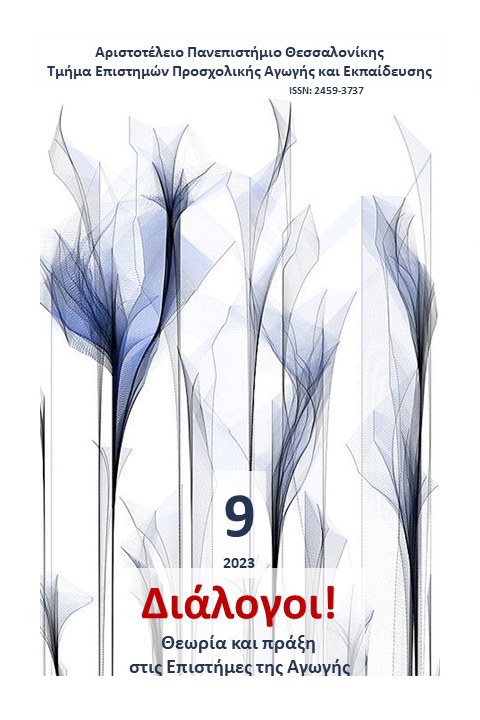“No one is an environmentalist by birth”. Η καλλιέργεια της οικολογικής πολιτειότητας των μαθητών μέσω σχολικών προγραμμάτων περιβαλλοντικής εκπαίδευσης. Μία συστηματική ανασκόπηση της ερευνητικής δραστηριότητας στο διάστημα 2000 έως 2023

Περίληψη
Λαμβάνοντας υπόψη την εμφανή περιβαλλοντική υποβάθμιση του πλανήτη και τις συνέπειές της σε κάθε επίπεδο της ανθρώπινης διαβίωσης, η καλλιέργεια της οικολογικής πολιτειότητας των μαθητών μέσω αποτελεσματικών εκπαιδευτικών προγραμμάτων προσδοκάται να τους καταστήσει ενεργούς φορείς κοινωνικής αλλαγής προς όφελος του περιβάλλοντος. Η παρούσα εργασία στοχεύει στη συνθετική αποτύπωση των παρεμβατικών προγραμμάτων περιβαλλοντικής εκπαίδευσης που διενεργήθηκαν σε όλη την ηλικιακή εμβέλεια της φοίτησης του μαθητικού πληθυσμού σε τυπικά σχολικά πλαίσια, ώστε να αναπτυχθεί η οικολογική του πολιτειότητα. Πραγματοποιήθηκε μια συστηματική βιβλιογραφική ανασκόπηση εμπειρικών μελετών δημοσιευμένων σε διεθνή, έγκριτα επιστημονικά περιοδικά στο χρονικό διάστημα 2000-2023. Τα αποτελέσματα της βιβλιογραφικής έρευνας στο τελικό δείγμα (n) των 35 μεθοδολογικά ετερόκλιτων μελετών κατέδειξαν ότι η πλειονότητα της επισκοπηθείσας ερευνητικής δραστηριότητας είχε λάβει χώρα στη Βόρεια Αμερική την περίοδο 2011-2015, σημειώνοντας θετικά εξαγόμενα. Μελετήθηκαν συμμετέχοντες ηλικίας κυρίως 5-12 ετών, σε παρεμβάσεις με διάρκεια συνήθως έως 12 εβδομάδες και με την πλειοψηφική υποστήριξη από το προσωπικό των εκάστοτε σχολείων. Η περιβαλλοντική πολιτειότητα των διδασκομένων ενισχύθηκε διαμέσου συμμετοχικών πρακτικών, όπου προήχθησαν ο αναστοχασμός αναφορικά με περίπλοκα οικολογικά θέματα, η κριτική σκέψη, η ανεξάρτητη και ενήμερη λήψη αποφάσεων, και η δικτύωση των μαθητευομένων με τις κοινότητές τους. Τα ευρήματα της έρευνας αντικατοπτρίζουν την αναγκαιότητα εστίασης των ερευνητών και των εκπαιδευτικών σε καινοτόμες παιδαγωγικές προσεγγίσεις που προωθούν την οικολογική πολιτειότητα των αποδεκτών τους, δρομολογώντας μια δίκαιη και δημοκρατική κοινωνική μεταστροφή με επίκεντρο την αειφορική διαχείριση του περιβάλλοντος.
Λεπτομέρειες άρθρου
- Πώς να δημιουργήσετε Αναφορές
-
Μουτσινάς Γ. (2023). “No one is an environmentalist by birth”. Η καλλιέργεια της οικολογικής πολιτειότητας των μαθητών μέσω σχολικών προγραμμάτων περιβαλλοντικής εκπαίδευσης. Μία συστηματική ανασκόπηση της ερευνητικής δραστηριότητας στο διάστημα 2000 έως 2023. Διάλογοι! Θεωρία και πράξη στις επιστήμες αγωγής και εκπαίδευσης, 9, 115–160. https://doi.org/10.12681/dial.36289
- Τεύχος
- Τόμ. 9 (2023)
- Ενότητα
- Επιστημονική Αρθογραφία

Αυτή η εργασία είναι αδειοδοτημένη υπό το CC Αναφορά Δημιουργού – Μη Εμπορική Χρήση – Παρόμοια Διανομή 4.0.
Οι συγγραφείς των άρθρων που δημοσιεύονται στο Διάλογοι! Θεωρία και Πράξη στις Επιστήμες Αγωγής και Εκπαίδευσης διατηρούν τα δικαιώματα πνευματικής ιδιοκτησίας επί των άρθρων τους, δίνοντας στο περιοδικό το δικαίωμα της πρώτης δημοσίευσης. Άρθρα που δημοσιεύονται στο Διάλογοι! Θεωρία και Πράξη στις Επιστήμες της Αγωγής και Εκπαίδευσης διατίθενται με άδεια Creative Commons 4.0 και σύμφωνα με την άδεια μπορούν να χρησιμοποιούνται ελεύθερα, με αναφορά στον/στη συγγραφέα και στην πρώτη δημοσίευση για μη κερδοσκοπικούς σκοπούς και με δικαίωμα τροποποίησης μόνον με παρόμοια διανομή (αν αναμείξετε, τροποποιήσετε, ή δημιουργήσετε πάνω στο υλικό, πρέπει να διανείμετε τις δικές σας συνεισφορές υπό την ίδια άδεια όπως και το πρωτότυπο).
To Τμήμα Επιστημών Προσχολικής Αγωγής και Εκπαίδευσης του Αριστοτέλειου Πανεπιστημίου Θεσσαλονίκης και το Εθνικό Κέντρο Τεκμηρίωσης διατηρούν το δικαίωμα να δημοσιεύουν, να αναπαραγάγουν, να παρουσιάζουν στο κοινό, να διανέμουν και να χρησιμοποιούν άρθρα που δημοσιεύονται στο Διάλογοι! Θεωρία και Πράξη στις Επιστήμες Αγωγής και Εκπαίδευσης σε οποιοδήποτε μέσο και μορφή είτε μεμονωμένα είτε ως μέρη συλλογικών έργων, για όλο το χρόνο διάρκειας προστασίας της πνευματικής ιδιοκτησίας και για όλες τις χώρες του κόσμου.
Αυτό περιλαμβάνει ενδεικτικά, και όχι αποκλειστικά, το δικαίωμα δημοσίευσης των άρθρων σε τεύχη του περιοδικού Διάλογοι! Θεωρία και Πράξη στις Επιστήμες Αγωγής και Εκπαίδευσης, αναπαραγωγής και διανομής μεμονωμένων αντιγράφων των άρθρων, αναπαραγωγής ολόκληρων των άρθρων σε άλλη έκδοση του Τμήματος Επιστημών Προσχολικής Αγωγής και Εκπαίδευσης του Αριστοτέλειου Πανεπιστημίου Θεσσαλονίκης και του Εθνικού Κέντρου Τεκμηρίωσης και αναπαραγωγής και διανομής των άρθρων ή περίληψης αυτών με χρήση πληροφορικού συστήματος αποθετηρίου.


